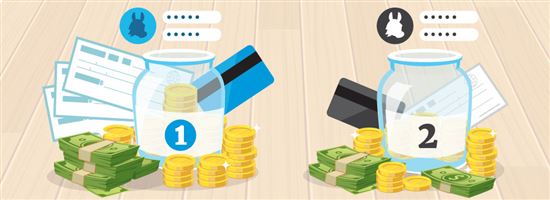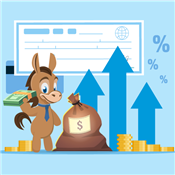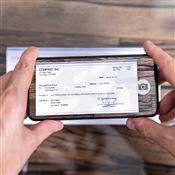Why Have Two Checking Accounts
Ad Disclosure: This article contains references to products from our partners. We may receive compensation if you apply or shop through links in our content. This compensation may impact how and where products appear on this site. You help support CreditDonkey by using our links.
Would having more than one checking account make your life easier or harder? Check out the pros and cons of having multiple bank accounts.
 |
- Is It Smart to Have Multiple Checking Accounts?
- Why Is It Good to Have Multiple Checking Accounts?
- Is There a Downside to Having Multiple Bank Accounts?
- Can I Have Two Checking Accounts at the Same Bank?
- Can I Have Two Checking Accounts at Different Banks?
- Compare Checking Accounts
- How to Open a Checking Account
Bank of America Advantage Banking - $300 Bonus Offer
- The $300 bonus offer is an online only offer and must be opened through the Bank of America promotional page.
- The offer is for new checking customers only.
- Offer expires 05/31/2025.
- To qualify, open a new eligible Bank of America Advantage Banking account through the promotional page and set up and receive Qualifying Direct Deposits* totaling $2,000 or more into that new eligible account within 90 days of account opening. Bank of America Advantage SafeBalance Banking® for Family Banking accounts are not eligible for this offer.
- Once all requirements are met, Bank of America will attempt to pay bonus within 60 days.
- Additional terms and conditions apply. See offer page for more details.
- *A Qualifying Direct Deposit is a direct deposit of regular monthly income – such as your salary, pension or Social Security benefits, which are made by your employer or other payer – using account and routing numbers that you provide to them.
- Bank of America, N.A. Member FDIC.
It's tough to get everything you need from just one checking account.
So why not have two?
Maybe one bank is offering a new bonus for qualifying new customers. Or you're looking for a high APY or want to be able to visit physical branches.
If that's on your mind, find out why you should or shouldn't get a second checking account.
Is it smart to have multiple checking accounts?
As long as you keep your bank accounts in good standing, it's perfectly fine to have multiple checking accounts. This means you need to keep a positive balance and avoid excessive overdrafts.
In fact, how many checking accounts you have and the amount in those accounts will not affect your credit score.
Chase Total Checking® - $300 Bonus
- New Chase checking customers enjoy a $300 bonus when you open a Chase Total Checking® account with qualifying activities
- With over 4,700 branches, Chase has the largest branch network in the U.S. plus access to more than 15,000 ATMs.
- Chase Mobile® app - Manage your accounts, deposit checks, transfer money and more -- all from your device.
- JPMorgan Chase Bank, N.A. Member FDIC
- Open your account online now
- Available online nationwide except in Alaska, Hawaii and Puerto Rico. For branch locations, visit locator.chase.com.
- Chase Overdraft Assist℠ - no overdraft fees if you're overdrawn by $50 or less at the end of the business day or if you're overdrawn by more than $50 and bring your account balance to overdrawn by $50 or less at the end of the next business day*
The average American owns 5 accounts across all types of financial situations (banks, credit unions, etc.) Most consumers will have multiple accounts with three different banks.[1]
Below, discover 7 compelling reasons why you might want to open another checking account.
Why is it good to have multiple checking accounts?
There are a few reasons why checking accounts can actually help your finances:
- Better organize your spending - A simple way to budget your money is the 50/30/20 rule.
- You might get new customer promotions and bonuses - If you're in the market for a new bank account, take a look at these bank bonuses (no direct deposit required).
- Separate your emergency fund from the rest of your budget - Everyone should have a rainy day fund. Use this calculator to get started, if you haven't already.
- Online banks pay higher interest and have fewer fees - Here's how to find the best online bank for you.
- Makes it easier to manage FDIC coverage limits - In a single bank account, you can get up to $250,000 insured by the federal government.
- Keep your business and personal finances separate - The right bank can help your business grow.
- You can have an individual and joint checking account - This is ideal if you're married and don't want to close your own account. Free checking accounts make it a lot easier to juggle more than one bank.
Online Checking Account - Earn Cash Back
- 1% cash back on up to $3,000 in debit card purchases each month. See website for details
- No fees
- Early Pay - Get your paycheck up to two days early with no charge
- No credit impact - You can apply without affecting your credit score.
- Access to over 60,000 no-fee ATMs in the U.S.
Is there a downside to having multiple bank accounts?
Be careful. You need to stay organized and vigilant with a second checking account. Look out for the following:
- More vulnerable to overdraft fees - You could be charged as much as $35 each time.
- Keeping track of deposits and withdrawals is tricky - You'll also need to look over separate debit cards, checkbooks, and online banking information (login, password, PIN, etc.).
- Beware of accumulating monthly service fees - Good thing banks with no maintenance fees or minimum deposits exist.
- More difficult to meet minimum balance requirements for multiple accounts - And thus harder to waive the monthly service fees (which can range from $4 - $20+, depending on the account).
Can I have two checking accounts at the same bank?
You can have multiple of the same checking account type at one bank. Your accounts will have different reference numbers and your bank may charge additional fees for the extra maintenance.
Keep in mind that some banks offer "relationship benefits" if you bundle your savings and checking accounts at their bank. This could mean a higher savings interest rate or waiving the monthly fee (or both).
Can I have two checking accounts at different banks?
You can have checking accounts at more than one bank. Not all banks are equal, so different financial institutions may offer perks like branch access or interest on checking accounts.
Here are some reasons why you might need (or want) an account with a different bank:
- Other banks might offer interest-bearing checking
- Other banks may have more convenient branch access
- You may have a separate joint account with a spouse at a different bank than your personal account
Compare Checking Accounts
Bank of America Advantage Banking - $300 Bonus Offer
- The $300 bonus offer is an online only offer and must be opened through the Bank of America promotional page.
- The offer is for new checking customers only.
- Offer expires 05/31/2025.
- To qualify, open a new eligible Bank of America Advantage Banking account through the promotional page and set up and receive Qualifying Direct Deposits* totaling $2,000 or more into that new eligible account within 90 days of account opening. Bank of America Advantage SafeBalance Banking® for Family Banking accounts are not eligible for this offer.
- Once all requirements are met, Bank of America will attempt to pay bonus within 60 days.
- Additional terms and conditions apply. See offer page for more details.
- *A Qualifying Direct Deposit is a direct deposit of regular monthly income – such as your salary, pension or Social Security benefits, which are made by your employer or other payer – using account and routing numbers that you provide to them.
- Bank of America, N.A. Member FDIC.
Chase Total Checking® - $300 Bonus
- New Chase checking customers enjoy a $300 bonus when you open a Chase Total Checking® account with qualifying activities
- With over 4,700 branches, Chase has the largest branch network in the U.S. plus access to more than 15,000 ATMs.
- Chase Mobile® app - Manage your accounts, deposit checks, transfer money and more -- all from your device.
- JPMorgan Chase Bank, N.A. Member FDIC
- Open your account online now
- Available online nationwide except in Alaska, Hawaii and Puerto Rico. For branch locations, visit locator.chase.com.
- Chase Overdraft Assist℠ - no overdraft fees if you're overdrawn by $50 or less at the end of the business day or if you're overdrawn by more than $50 and bring your account balance to overdrawn by $50 or less at the end of the next business day*
Online Checking Account - Earn Cash Back
- 1% cash back on up to $3,000 in debit card purchases each month. See website for details
- No fees
- Early Pay - Get your paycheck up to two days early with no charge
- No credit impact - You can apply without affecting your credit score.
- Access to over 60,000 no-fee ATMs in the U.S.
Business Checking Account - $400 Bonus
- Open a new Truist Simple Business Checking or Dynamic Business Checking account online, via phone, or in a branch from 4/1/2025 through 9/30/2025 and earn $400 by making Qualifying Deposits* of $2,000 or more into your new account within 30 days of account opening. Must be a new Truist business checking client, Terms Apply.
- Enrollment in the promotion is required at the time of account opening using promo code SB25Q2BIZAFL to be eligible for a promotion reward. Refer to the Account Opening & Promotion Enrollment sections below for instructions.
- *Qualifying Deposits for new business checking accounts exclude debit card credit transactions and NSF fee refunds. Deposits can be made on a one-time basis or cumulatively over the 30 days.
Chase Secure Banking℠ - $100 Bonus
- New Chase checking customers enjoy a $100 checking account bonus when you open a Chase Secure Banking℠ account with qualifying transactions. Open online or at any Chase branch.
- Set up direct deposit and you may get your money up to two business days early-exclusively for Chase Secure Banking℠ customers.
- No minimum deposit to open an account and get started plus no overdraft fees with a Chase debit card that helps you stay within your balance.
- No need to worry about overdraft fees - Chase Secure Banking℠ allows you to spend only the money you have available.
- Chase Secure Banking℠ customers told us they save an average of more than $40 per month on fees after opening their account.
- Pay bills, cash checks and send or receive money with Zelle® with a Chase Secure Banking℠ account.
- Bank from anywhere with access to more than 15,000 Chase ATMs, more than 4,700 Chase branches, the Chase Mobile® app and Chase.com.
- JPMorgan Chase Bank, N.A. Member FDIC.
How to Open a Checking Account
Once you've done your research on the best bank for you, opening a checking account is easy-peasy.
- Have all the required documents on hand:
- Government issued ID, like a driver's license
- Social Security number
- Proof of address (lease or utility bill)
- Contact information (name, home address, email address, phone number)
- Date of birth
- Government issued ID, like a driver's license
- Have enough money for the opening deposit (if required).
- Fill out an application online or in-person.
- Sign any necessary paperwork.
- Make opening deposit (if required).
- Use your shiny new checking account!
- Utilize money management apps to see everything in one place
- Set up regular direct deposits to maintain the required minimum balance
- Divvy up your spending money appropriately with online budgeting tools
- Consider opening checking accounts with fewer fees to keep track of
- Always keep personal accounts and business bank accounts separate
Bottom Line
You can certainly have more than one checking account. In fact, it may even benefit you. The number of accounts you should have will ultimately depend on your specific financial needs. Are you looking for interest bearing accounts and physical branches/ATMs? Or are you hoping to open a separate business checking account?
Do your due diligence when finding a good checking account for you and be sure to keep it in good standing and waive the monthly fees.
References
- ^ "ATM Banking: It's Not Just About Cash Withdrawal Anymore": Mercator Advisory Group, 2019.
Amber Kong is a content specialist at CreditDonkey, a bank comparison and reviews website. Write to Amber Kong at amber.kong@creditdonkey.com. Follow us on Twitter and Facebook for our latest posts.
Note: This website is made possible through financial relationships with some of the products and services mentioned on this site. We may receive compensation if you shop through links in our content. You do not have to use our links, but you help support CreditDonkey if you do.
|
|
|








